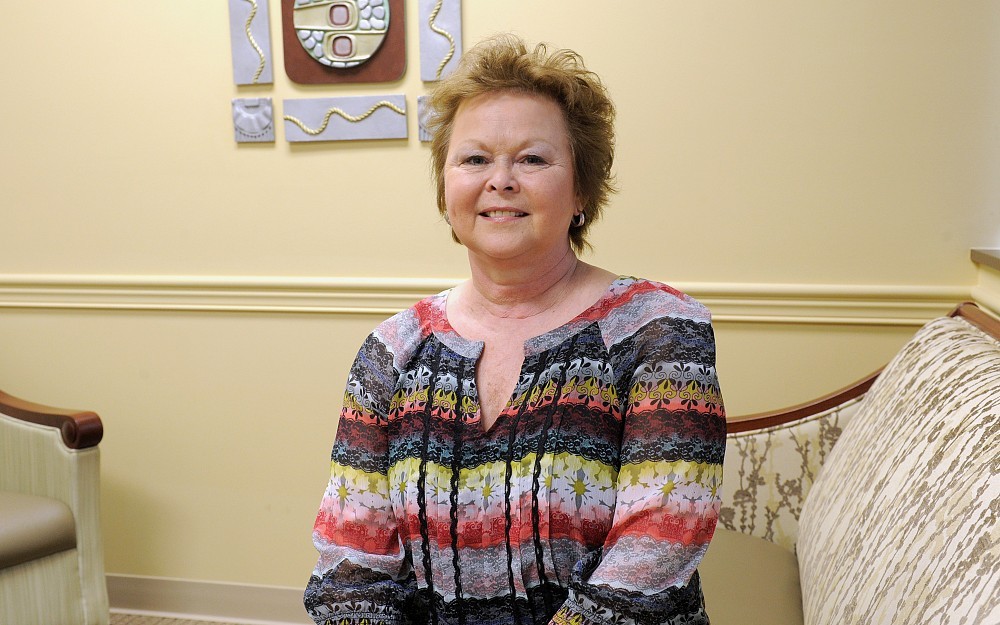
UC Health Doc Helps Patient Maintain Life Balance, Despite Incurable Cancer
The saying goes that "third time is a charm but for patient Georgia Anderson, it turned out the "charm was with number four.
W. Edward Richards, MD, a UC Health gynecologic oncologist and director of the UC College of Medicines division of gynecologic oncology, was the fourth doctor Anderson had seen since her initial diagnosis of fallopian tube cancer in the summer of 2006. She struggled to find a physician who met both her medical and emotional needs.
"One oncologist went so far as to put an expiration date on my head and told me to get my affairs in order. I was devastated, but then I decided that answer wasnt good enough for me. Thats when I found Dr. Richards, who was the perfect match for my oncology needs, recalls Anderson. "My sister and husband went with me to that first appointment. Dr. Richards reassured me that we were not out of options. After the consultation, I went to shake his hand and he shrugged it off, saying, We hug around here.
Fallopian tube cancer is rareaffecting only about 2 percent of women in the United Statesand is treated with an approach similar to ovarian cancer. When Anderson was first diagnosed, she didnt have any severe symptoms. She was playing with her dog, and he hit her lower left side. The next day, she felt surprising pain in the spot where her dog hit and had a lingering fever. After consulting with her family doctor, Anderson was sent to the hospital for suspected diverticulitis. She had a procedure to address uterine bleeding the following March after going through menopause. She had lost 5 pounds.
"I didnt really think anything of it, Anderson recalls. "What woman doesnt want to lose 5 pounds?
The pathology results from her uterine procedure didnt raise any red flags but in July of the same year she was diagnosed with advanced fallopian tube cancer that had spread to her colon and liver.
Before she came into Richards care, she had a hysterectomy, a colon resection and surgery to address a metastasis to the liver. She has been through five different chemotherapy regimenssome of them twice. She lost her hair twice, but jokes that she missed her eyelashes more. This spring, she was screened for a phase I first-in-human cancer clinical trial being conducted at UC but did not qualify.
"My cancer isnt curable, but Dr. Richards has helped me achieve balance and maintain a wonderful quality of life, says Anderson. "I love that man and his staff.
Now shes focused on spending time with her two grown children, her husband and their four grandchildren.
"I encourage everyone to listen to the signs their body is giving them. Sometimes the message is more of a whisper than a shout. Im thankful that my cancer was diagnosed when it was. Im still here, despite the odds. The Lord has blessed me in many ways, including giving me a great cancer care team.
As part of the UC Cancer Institute, UC Health Gynecology Oncology is currently recruiting participants for clinical trials to investigate new treatment options for various forms of gynecologic cancer. This includes diseases that involve the cervix, ovaries, uterus and vulva. Richards and his colleagues Heather Pulaski, MD, and Thomas Reid, MD, specialize in minimally invasive gynecologic surgery procedures, including robotic surgery. To find a trial, visit cancer.uc.edu or call 513-584-7698.
» The UC Cancer Institute is part of the Cincinnati Cancer Center, a joint cancer program involving the UC College of Medicine, Cincinnati Childrens Hospital Medical Center and UC Health. The collaborative initiative brings together interdisciplinary research teams of caring scientists and health professionals to research and develop new cures, while providing a continuum of care for children, adults and families with cancer.
Related Stories
Increasing syphilis cases highlight treatment barriers across...
May 14, 2024
The University of Cincinnati's Carl Fichtenbaum spoke with the Cincinnati Enquirer about a recent report that found Hamilton County syphilis cases reached a six-year high in 2023.
Cheers to saving lives
May 14, 2024
Hoxworth Blood Center is partnering with local breweries to host more than 15 mobile blood drives this summer.
Local 12: Brothers donate organs to their mother
May 13, 2024
Local 12 highlighted the story of Lynnette Knott, who received organ donations from sons Mark and Matt performed by University of Cincinnati physicians.
